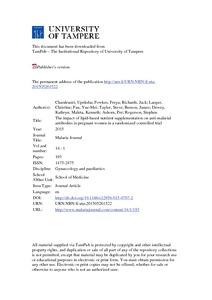The impact of lipid-based nutrient supplementation on anti-malarial antibodies in pregnant women in a randomized controlled trial
Chandrasiri, Upeksha; Fowkes, Freya; Richards, Jack; Langer, Christine; Fan, Yue-Mei; Taylor, Steve; Beeson, James; Dewey, Kathryn; Maleta, Kenneth; Ashorn, Per; Rogerson, Stephen (2015)
Chandrasiri, Upeksha
Fowkes, Freya
Richards, Jack
Langer, Christine
Fan, Yue-Mei
Taylor, Steve
Beeson, James
Dewey, Kathryn
Maleta, Kenneth
Ashorn, Per
Rogerson, Stephen
2015
Malaria Journal 14 1
193
Lääketieteen yksikkö - School of Medicine
This publication is copyrighted. You may download, display and print it for Your own personal use. Commercial use is prohibited.
Julkaisun pysyvä osoite on
https://urn.fi/URN:NBN:fi:uta-201505261522
https://urn.fi/URN:NBN:fi:uta-201505261522
Kuvaus
BioMed Central open access
Tiivistelmä
Background
Malaria and undernutrition frequently coexist, especially in pregnant women and young children. Nutrient supplementation of these vulnerable groups might reduce their susceptibility to malaria by improving immunity.
Methods
Antibody immunity to antigens expressed by a placental-binding parasite isolate, a non-placental binding parasite isolate, merozoites and schizonts at enrolment (before 20 gestation weeks) and at 36 gestation weeks were measured in 1,009 Malawian pregnant women receiving a daily lipid-based nutrient supplement, multiple micronutrients or iron and folic acid, who were participants in a randomized clinical trial assessing the effects of nutrient supplementation on pregnancy outcomes and child development(registration ID: NCT01239693 webcite).
Results
Antibodies to placental-binding isolates significantly increased while antibodies to most merozoite antigens declined over pregnancy. Overall, after adjustment for covariates, the type of supplementation did not influence antibody levels at 36 gestation weeks or the rate of change in antibody levels from enrolment to 36 weeks. A negative association between maternal body mass index and opsonizing antibodies to placental-binding antigens (coefficient (95% CI) -1.04 (−1.84, −0.24), was observed. Similarly, women with higher socioeconomic status had significantly lower IgG and opsonizing antibodies to placental-binding antigens. Neither of these associations was significantly influenced by the supplementation type.
Conclusions
In the current cohort nutrient supplementation did not affect anti-malarial antibody responses, but poor and undernourished mothers should be a priority group in future trials.
Malaria and undernutrition frequently coexist, especially in pregnant women and young children. Nutrient supplementation of these vulnerable groups might reduce their susceptibility to malaria by improving immunity.
Methods
Antibody immunity to antigens expressed by a placental-binding parasite isolate, a non-placental binding parasite isolate, merozoites and schizonts at enrolment (before 20 gestation weeks) and at 36 gestation weeks were measured in 1,009 Malawian pregnant women receiving a daily lipid-based nutrient supplement, multiple micronutrients or iron and folic acid, who were participants in a randomized clinical trial assessing the effects of nutrient supplementation on pregnancy outcomes and child development(registration ID: NCT01239693 webcite).
Results
Antibodies to placental-binding isolates significantly increased while antibodies to most merozoite antigens declined over pregnancy. Overall, after adjustment for covariates, the type of supplementation did not influence antibody levels at 36 gestation weeks or the rate of change in antibody levels from enrolment to 36 weeks. A negative association between maternal body mass index and opsonizing antibodies to placental-binding antigens (coefficient (95% CI) -1.04 (−1.84, −0.24), was observed. Similarly, women with higher socioeconomic status had significantly lower IgG and opsonizing antibodies to placental-binding antigens. Neither of these associations was significantly influenced by the supplementation type.
Conclusions
In the current cohort nutrient supplementation did not affect anti-malarial antibody responses, but poor and undernourished mothers should be a priority group in future trials.
Kokoelmat
- Artikkelit [6140]
